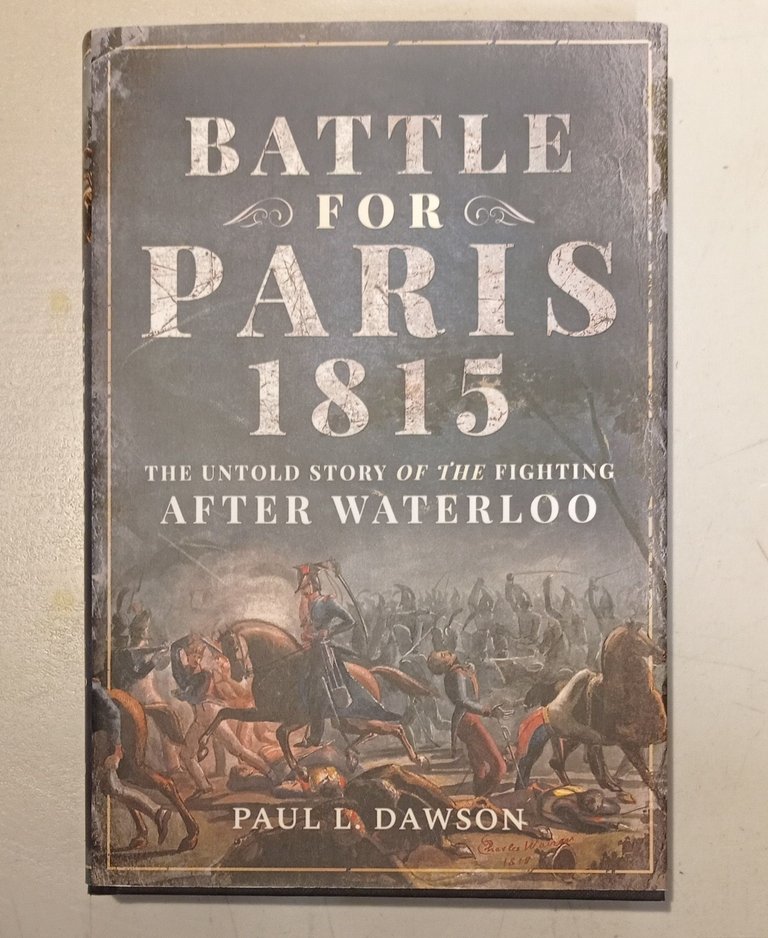The obscure bits on the edges of history are something that has always fascinated me. All those bits they don't teach in schools, the story of what came just before or just after the well known parts of history.
One of the periods in history I am most fascinated by is the Napoleonic Wars.
This book most definitely ticks both of those boxes !

Photo by me, of my copy of the book

For most people, the Napoleonic Wars was ended by the Battle of Waterloo, and many historians (particularly those writing in English) reply primarily or even exclusively on English sources to tell the story.
But the reality is that Waterloo was decisive, but it wasn't the end. In most Napoleonic battles, the losing side withdrew, reorganised and were ready to fight again a couple of days later. At Waterloo, the army broke because of internal divisions, with many believing they were betrayed by secret royalists in their midst.
Marshal Grouchy, much maligned by subsequent historians, gave the Prusssians a bloody nose at Wavre which delayed their pursuit of the broken main French army. He then carried out a textbook fighting retreat back to Paris which gave the army time to reconstitute itself.
At the gates of Paris, the French army had re-organised itself to the point where it outnumbered the advancing Allies, and was determined to give them a stiff fight. But despite winning several large-scale skirmishes or small battles, politics came into play and the Provisional Government arranged a truce and then surrender with the Allies without consulting the army's leaders.

Paul Dawson, the author if this book, makes clear in the introduction that he has used primarily (but not exclusively) French sources in his research. It comprises a mix of letters, memoires and army archive records.
He recognises that letters written at the time would inevitably have been written with only knowledge of what was going on in the local area, which can lead to errors and misconceptions. Memoires are useful but almost always biased both to make the author look good and to get past political censors. The official archives are a fascinating source of reports on unit strengths, actions and locations, and it is a testament to the professionalism of the French army that regiments were still sending in regular reports in such a chaotic time !
One of the things I most like about this book is the author's attempts to present both sides of the many controversial events that happened in a fair and sympathetic way. He recognises that he is looking at people working under huge stress with very incomplete information, just trying to do the best they can in a very difficult situation.
This book is very much a story of the resilience, élan and determination of the ordinary French soldiers and regiments. Much of the elite Garde Imperiale had fallen or been taken prisoner at Waterloo. This part of the war was carried on by ordinary Line units, with their own officers and mid-level generals providing direction and leadership. They were fighting not for the regime, but for their own pride and professionalism, and to save France from invading enemies.
The author doesn't shy away from the political situation in France at the time. Both army and society were divided. Napoleon had only recently returned from Elba, and hadn't had time to fully get back in control by the time he was forced to fight. Political actors like Fouche and Talleyrand worked for their own advantage, while senior army commanders like Davout and Soult did their duty but seem to have believed that another restoration of the monarchy and peace at almost any cost was the best outcome for France rather than endless war.
All in all, this is a very worthwhile read on an unusual subject. It's well researched but written in an accessible and chronologically logical style. It focuses solely on the Northern theatre of the war, which is a shame because there were interesting event around the frontiers, but I can understand that trying to cover what happened there would led to a book twice as long !
The book has eight pages of black and white plates and a wealth of excellent tables detailing unit strengths and casualties and other "hard" information. Most importantly of all, it attempts to look at both sides of the debate and reach fair conclusions.

Battle For Paris 1815, The Untold Story of the Fighting After Waterloo - by Paul L Dawson, published by Frontline Books (part of Pen & Sword Books Ltd), 2019.
ISBN: 978 1 52674 927 7
A book about war...
To be honest, I haven't even read about Napoleon 😂😂😭
I just know the bare minimum of the man😂
Thanks for your comment ! It's a fascinating period, and well worth reading up on.
The book itself is about war, but much more than that it's a sympathetic study of how people and armies react, and the decisions they make, when everything around them is falling apart.
I see...
That does sound interesting
I love history and already learned as a child each country, even the teacher, tells what fits the country best. If it comes to France they are famous for fighting with and for the people, revolutions (not only if it comes to art) always seem to start with them.
Wars are strange, bonds through marriages but plenty left for greed and the need to under press..enough is never enough. Today best mates, tomorrow sworn enemies. Till today I can't say much has changed. Each country seems to play the same role during the next war. It's always the same country that is destroyed, the same countries fight,while the same others surrender, are the traitors who'll never been punished for their and those who started war call themselves heroes because they saved the world from a fake enemy destroying it all. The same countries are always the bad guy it makes me wonder why.